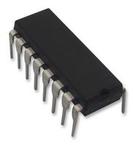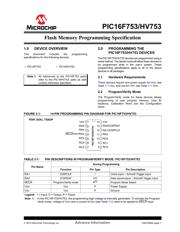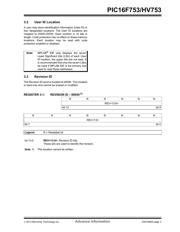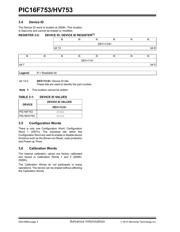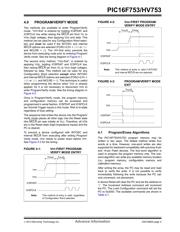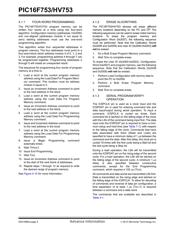下载

2013 Microchip Technology Inc. Advance Information DS41686A-page 1
PIC16F753/HV753
1.0 DEVICE OVERVIEW
This document includes the programming
specifications for the following devices:
2.0 PROGRAMMING THE
PIC16F753/HV753 DEVICES
The PIC16F753/HV753 devices are programmed using a
serial method. The Serial mode will allow these devices to
be programmed while in the user’s system. These
programming specifications apply to all of the above
devices in all packages.
2.1 Hardware Requirements
These devices require one power supply for VDD, see
Table 7-1 V
DD, and one for VPP, see Tabl e 7- 1 VIHH.
2.2 Program/Verify Mode
The Program/Verify mode for these devices allows
programming of user program memory, User ID
locations, Calibration Word and the Configuration
Word.
FIGURE 2-1: 14-PIN PROGRAMMING PIN DIAGRAM FOR PIC16F753/HV753
TABLE 2-1: PIN DESCRIPTIONS IN PROGRAM/VERIFY MODE: PIC16F753/HV753
•PIC16F753 •PIC16HV753
Note 1: All references to the PIC16F753 parts
refer to the PIC16HV753 parts as well
(unless otherwise specified).
Pin Name
During Programming
Function Pin Type Pin Description
RA1 ICSPCLK I Clock input – Schmitt Trigger input
RA0 ICSPDAT I/O Data input/output – Schmitt Trigger input
MCLR
Program/Verify mode P
(1)
Program Mode Select
VDD VDD P Power Supply
V
SS VSS PGround
Legend: I = Input, O = Output, P = Power
Note 1: In the PIC16F753/HV753, the programming high voltage is internally generated. To activate the Program/
Verify mode, voltage of V
IHH and a current of IIHH (see Table 7-1) need to be applied to MCLR input.
PIC16F753/HV753
1
2
3
4
14
13
12
11
5
6
7
10
9
8
VDD
RA5
RA4
MCLR
/VPP/RA3
RC5
RC4
RC3
V
SS
RA0/ICSPDAT
RA1/ICSPCLK
RA2
RC0
RC1
RC2
PDIP, SOIC, TSSOP
Flash Memory Programming Specification

